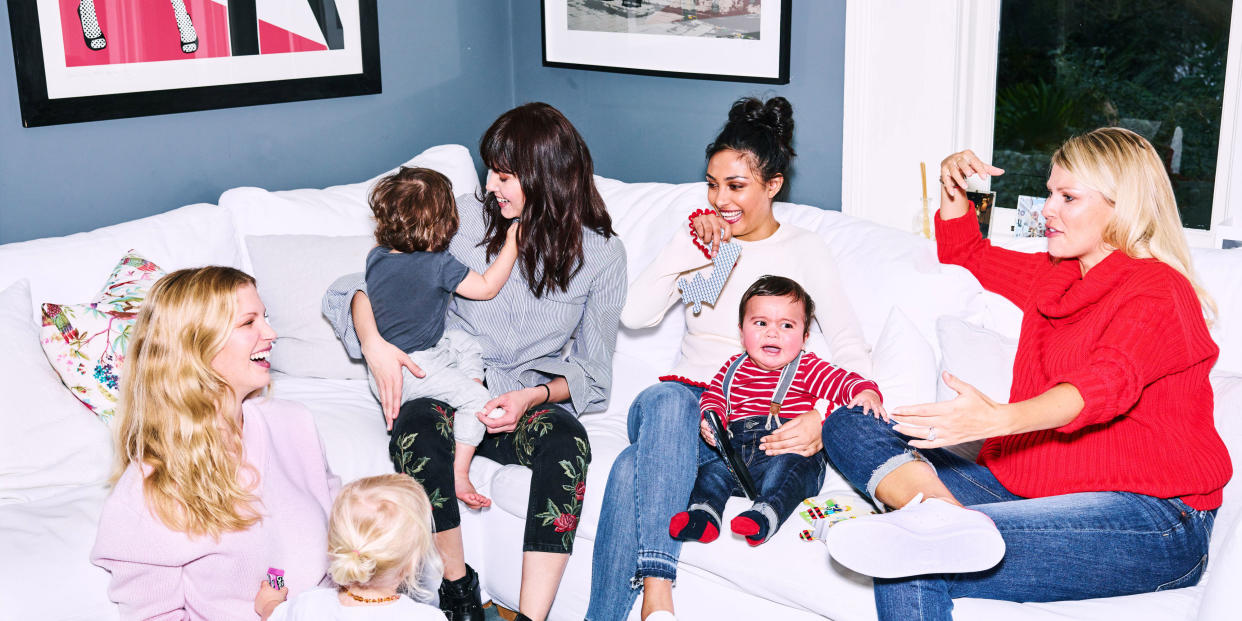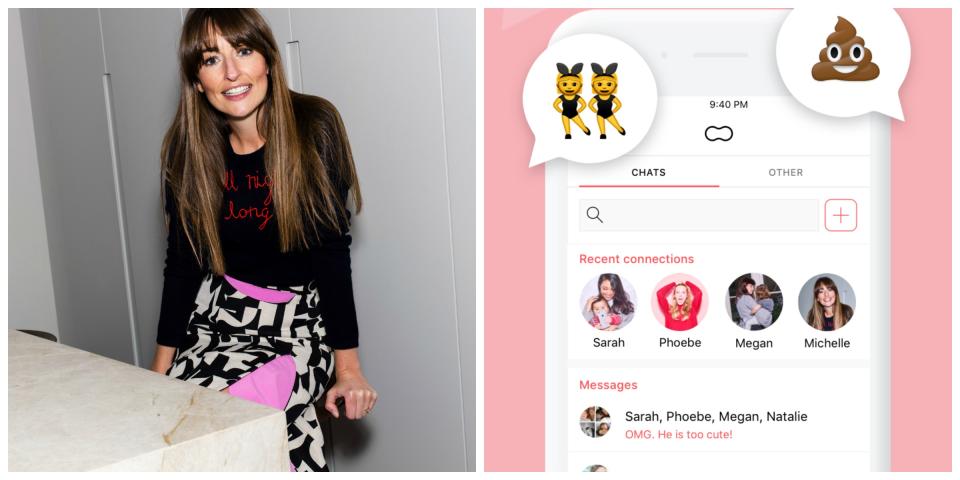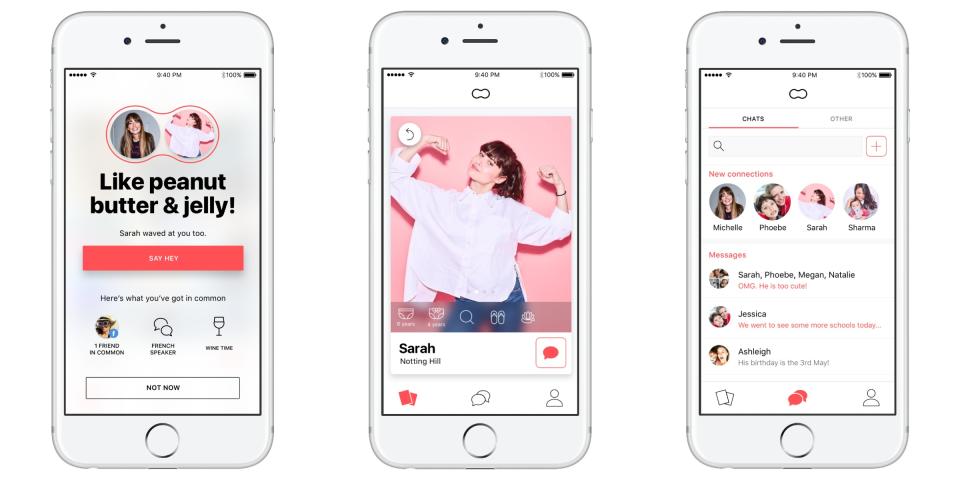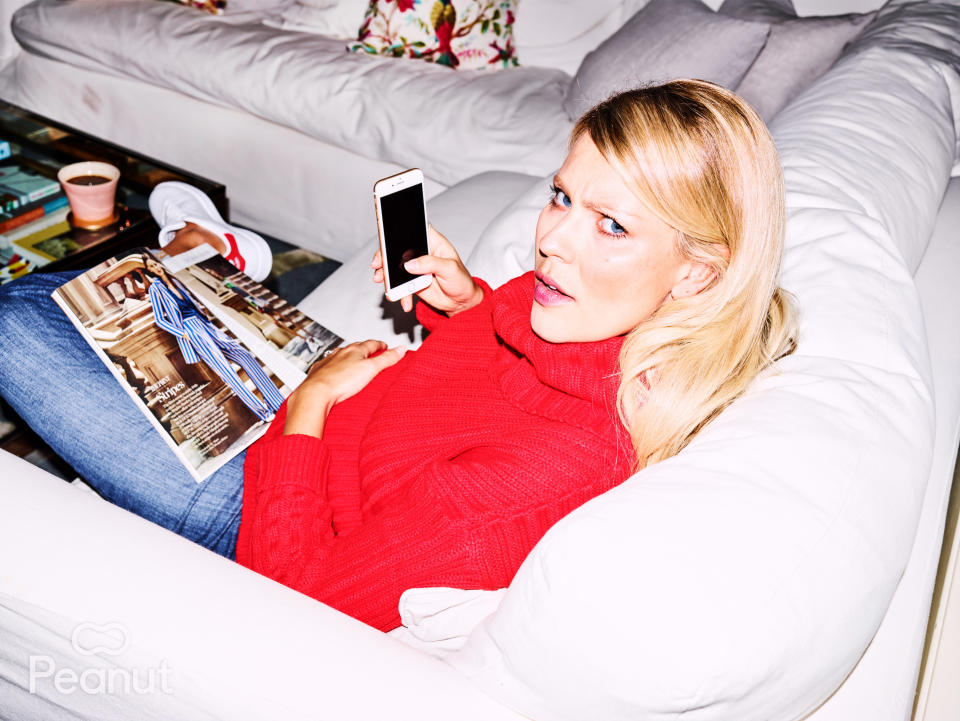Can *Anything* Make Finding Mom Friends Easier?

When Michelle Kennedy gave birth, she felt isolated, a feeling many moms can probably relate to. "I didn't know mummies," she says." I wanted to have a mate on the same wavelength. There was a lot of faking it." She didn't want to fake friendship. (Who does?)
Unfortunately, she found that the way friendship is marketed towards mothers is, well, not contemporary. Web forums, where women speak in sugarcoated abbreviations like "DH" [dear husband] and "DS" [dear son] with archaic interfaces, "felt infantilizing," she says. "Just because I became a momma, I didn't stop being mobile." And also, she didn't stop being...herself. " I was adamant that I didn't stop being me because I became a mummy," she says. Plus, she didn't want to talk like those women, with their cutesy abbreviations. "It didn't feel like me. That wasn't who who I was."
There are a lot many women who balk at incorporating those abbreviations into their vocabularies and who don't align with the communities on those forums. But sometimes they - and the classic Mommy & Me classes - are the only ways for new moms to find a sense of community, even if it's feigned. And if your child's sleep schedule makes it difficult to attend those classes on a regimented schedule, as Kennedy's child did, that can make it even harder to find ways to meet likeminded people.
Making friends as an adult woman - even without children - is an already stressful concept. If you want someone to relate to during your pregnancy and to have playdates with once your kids are born, do you make a blood pact with your friend to have kids at the same time? What if that falls through? Do you run screaming through the park "FRIEND ME!!!" (You don't.) Or do you force yourself to pretend to have something in common with people in forced scenarios, just so that you feel less alone?
"Sitting on your own at home all day with a baby, feeling freaked out and isolated – that's scary. Speaking to someone on app knowing you already have a baseline of commonality - that's not scary."
Kennedy - a former lawyer who was the Deputy CEO of European dating app Badoo and later worked to help launch the dating app Bumble - thought there was a solution for moms: an app (because isn't that the solution for everything these days?). It would be called Peanut, and it would be a place for moms to find friends - a community where women have something in common from the get-go: the fact that they're moms. On the surface, that sounds the same as anything other community created for moms, right? But that's where Kennedy had something different in mind.
Aside from the fact that it would let you straight-up skip the Mommy & Me classes (a relief for anyone who finds them burdensome), Peanut would be an aesthetically pleasing app with a user-friendly appearance, not an interface that looks like it came from 1994. It would skip language that assumes the women have nothing else going on in their lives, and talk to millennial women who have high standards for how an app should look and act, because these women do everything on their phones. Think about it: Modern moms are not confining themselves to desktops.
"I really felt that this entire generation of women deserves this," she says. Maybe making friends as a grown woman with kids doesn't have to suck, after all.

It's clear who Peanut is trying to appeal to: The app's imagery and marketing show off attractive, "cool" moms who have definitely figured out how make it to the hairdresser and put on some mascara while also diapering a child. It's aspirational, which might seem counterintuitive given the movements to celebrate "real moms!" who forego makeup. But what if for some women "being real" is about at least looking like you have it all together?
The app officially launched on February 15. It works like Bumble or Tinder, only kinder. You sign up using Facebook, which Kennedy says serves as a "safety point," and then the on-boarding process is relatively simple: You give some info about yourself - like the age and gender of your kid, where you went to school, the usual - which Kennedy says can be super helpful. For instance, maybe you want to hang out with a mom with a kid the same age as yours so they can have a playdate while you guys hang out, or maybe you want to chill with someone who speaks Spanish, because then you can speak Spanish in front of your kids. You also join "packs," or groups based on fun, silly characteristics (one is "wine time," for instance). Packs serve the purpose of helping you easily find women with something in common - or who at least identify with the same characteristics as you, since the app foregoes heavy-duty profile writing. Then, you can "wave" to women (it's a hell of a lot less cruel than swiping yes or no) that you might think you'd have something to talk about with. If they wave back, you "match" and can message each other, similarly to Bumble.

From there, the app machine learns your preferences - so the more you use it, the more likeminded moms you'll see on the app. And if you meet in person and have nothing to talk about? Kennedy says you can always fall back on talking about kids; you at least have that in common! Though really, she stresses that this about women making friends as women, using the mom part simply as an intro.
Another thing that makes Peanut unique is that it allows for people to create meetups and groups like a group trip to the zoo or park, for instance - something that certainly takes the pressure off when trying to make a new BFFs. It also makes it less of a risk situation, Kennedy says.
But what about all the cool women in your town that aren't moms? That's a whole subsection of women who aren't on the app. Kennedy is fine with that, because that's Kennedy is trying to sell here. It's not that she thinks non-moms can't offer friendship, rather, she's trying to bring together people in similar circumstances. "Sometimes you just need the advice [of someone in the same situation]," she explains.

While women obviously aren't averse to apps that encourage relationships - between OkCupid, Bumble, and Tinder, how could they be? - there's still something awkward about seeking adult female friendship. Bumble has gone down that road before with Bumble BFF, which yielded some mediocre reviews ("It made me feel creepy," one writer for Oxygen wrote). Game-ifying friendship could be off-putting for some. And with the mom-part thrown into the mix, you're not just facing the challenge of meeting new humans, it's about figuring out how to naturally connect with other women who have full lives already. And can an algorithm ever really lead to friendship?
Kennedy doesn't think making friends through an app should be remotely scary; not, at least, after you've birthed a child.
"This is about making a real-life interactions easier, not scarier," she says, "Sitting on your own at home all day with a baby, feeling freaked out and isolated – that's scary. Speaking to someone on app knowing you already have a baseline of commonality - that's not scary."
Peanut, Kennedy stresses, is supposed to be used to enhance not supplant human interaction. And whether your first mode of interaction is on your phone or in person, she wants women to feel confident enough to make the effort to reach out to make friends. "You can be brave and reach out," she says. "Speak to people, go to classes, be yourself - be confident."
Follow Redbook on Facebook.
You Might Also Like

